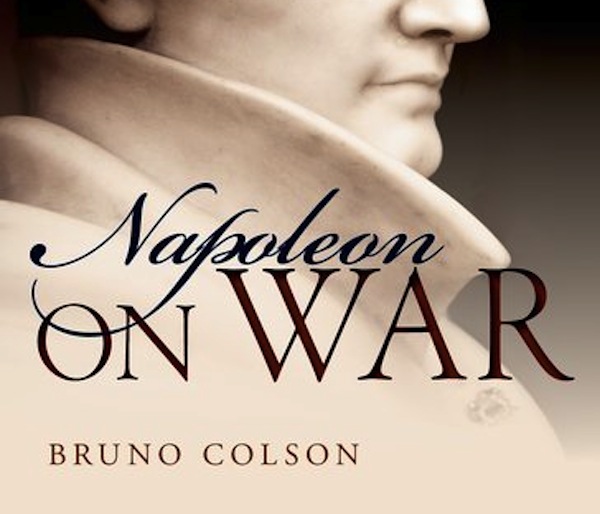Book Review: “Napoleon On War” — Might Makes Right, At Least for A While
Bruno Colson’s book is a wonder of research, and serves to shed light on the state of Napoleon’s mind.
Napoleon on War, by Bruno Colson. Oxford University Press, 484pp. $45.00.

by Thomas Filbin
Because this is the bicentennial of the Battle of Waterloo, the already long list of books on Napoleon has grown even longer. Napoleon was revered by the French of his time, but reviled by most of Europe, regarded by them as we do Hitler. The destructive wars the Corsican upstart wrought were considered by him good and necessary tools to advance his world view. War then, as it had been since time immemorial, was a legitimate function of the state. To attack, invade, and dominate was considered the prerogative of kings when their interests and cupidity demanded it. International law existed, but it was as much ignored as obeyed. Might made right, and the man with the largest army in Europe had his way, at least for a while, with everyone else.
When in exile, Napoleon started to record and codify his thoughts and opinions on the waging of war, but for whatever reason he destroyed his notes. Perhaps as he faced death he might have decided that he wanted to be remembered more as a benevolent ruler than as a warrior. Bruno Colson, a professor at the University of Namur in Belgium, has made it a labor of love to collect Napoleon’s thoughts contained in his other writings, and has culled material from reports, journals, and memoirs of persons close to him. This masterful compendium is arranged by topics great and small. He starts with the nature and theory of war, and moves to strategy and resources, in each section taking the time to delve deeply and consider features such surprise and cunning, boldness, perseverance, and more measurable criteria like size of force, deployment, and terrain.
Napoleon’s thoughts on the overall cruelty and suffering that war exacts are interesting. He demands that war be violent and waged on a grand scale to order to encourage an early surrender. He saw this as the most efficient way to be the most humane in inhuman conditions. Namby-pamby war making was to be despised.
When Napoleon invaded Egypt he hoped for a quick victory, and indeed subscribed to the notion that a peaceful surrender of a town or garrison should have the conqueror’s mercy, but being forced to take a place by storm with casualties meant retribution. In Jaffa, Napoleon sent an envoy to offer terms, but he was beheaded. Napoleon’s response was swift and brutal.
At 5 o’clock we were masters of the town which, for twenty-four hours, was given over to pillaging and all the horrors of war, which have never seemed so hideous to me. 4,000 of the Djezzar’s troops were put to the sword; there were 800 gunners. Part of the civilian population was massacred.
The same fate befell a town in Spain conquered by force in 1808. Napoleon said, “The town has been pillaged: it is the law of war, since it was taken arms in hand.” But after a terrible battle in 1807, he wrote Josephine, “My friend, I am still at Eylau. The ground is littered with the dead and wounded. This is not the best part of war; one suffers and the soul is oppressed at the sight of so many victims.”
Generals have always had to deal with pillaging. Before the age of organized armies, pillage was one of the chief forms of soldierly compensation. Taking the wealth from the defeated seemed normal, but there had to be some rules modifying behavior, some sort of code standing against undue exactions from the civilian population now under an army’s control. Colson notes that, “the testimony of chroniclers does not make it possible to define Napoleon’s position on pillaging precisely.” He tolerated a certain amount of it, or at least did not excessively punish it, being a realist.
Napoleon was a student of the wars of history, and his early education included the classics and the world of the Greeks and Romans became his template for conquest. He formulated and refined his theories continually; war was his business, and like any businessman, strategy, knowing the competition, and the seeking of every advantage was crucial to achieving victory. Preparation and anticipation were as important as the actions taken on the day of battle.
In the matter of tactics he disagreed with experts, such as von Clausewitz, who held that defenders in general held an intrinsic advantage. Napoleon felt large concentrations of applied force outweighed dug in positions even in terrain that favored opponents.

Author Bruno Colson — collecting Napoleon’s thoughts on war was a labor of love.
He also argued against splitting forces. Breaking out into two wings to encircle the enemy was not always favorable; it left one with two weakened flanks against a dense body of the opposition. (His mind might have changed on this after Waterloo, when being outflanked contributed to the French defeat.) He favored the weight of troop concentration and sheer outnumbering when possible. Indeed, superior numbers came easily to Napoleon because France was the most populous country in Europe. He believed in conscription, both because it was effective and also created a bond among one’s citizens; having served in the military established a lifelong link of loyalty with the state.
Napoleon’s exile on St. Helena gave him time to ruminate. Much of the material of Colson’s book comes from people, British mainly, who had contact with him in his last years. They recorded his thoughts, which he was not averse to sharing. As militaristic as he was, most of the writing on Napoleon describes his self-image as that of a reformer, a savior, a progressive, one who was in the avant-garde of a period of European history which emphasized progress and a certain Romantic outlook.
War to Bonaparte was both necessary and useful, but one cannot help but think that even he saw it as a limited opportunity for governance. Rule must follow conquest, and subjects needed reasons to be loyal beyond the fact that they were defeated.
Colson’s volume is a wonder of research, and serves to shed light on the state of Napoleon’s mind when so much written about him is of the externals; style, accomplishments, victories, and defeats. The Emperor was at times an enigma, and at other times merely a bundle of contradictions. Although preferring to be known as the moving force for a new era of French civilization, he was a military man by training and temperament, and in the end the Napoleonic era will always be about his wars. Napoleon on War offers fascinating glimpses into the working methods of one of the most renowned strategists in history.
Thomas Filbin reviews books for newspapers, literary reviews, and academic periodicals
